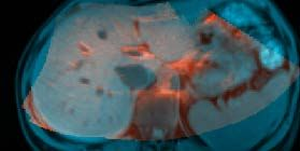Information
- Publication Type: Conference Paper
- Workgroup(s)/Project(s):
- Date: September 2014
- ISBN: 978-3-905674-62-0
- Publisher: Eurographics Association
- Note: The electronic version of the proceedings is available from the Eurographics Digital Library at http://diglib.eg.org
- Location: Vienna, Austria
- Lecturer: Markus Müller
- ISSN: 2070-5778
- Event: 4th Eurographics Workshop on Visual Computing for Biology and Medicine
- Editor: Ivan Viola and Katja Buehler and Timo Ropinski
- Booktitle: Proceedings of EG VCBM14
- Conference date: 4. September 2014 – 5. September 2014
- Pages: 173 – 180
Abstract
Real-time three-dimensional (also known as 4D) ultrasound imaging using matrix array probes has the potential to create large-volume information of entire organs such as the liver without external tracking hardware. This information can in turn be placed into the context of a CT or MRI scan of the same patient. However for such an approach many image processing challenges need to be overcome and sources of error addressed, including reconstruction drift, anatomical deformations, varying appearance of anatomy, and imaging artifacts. In this work,we present a fully automatic system including robust image-based ultrasound tracking, a novel learning-based global initialization of the anatomical context, and joint mono- and multi-modal registration. In an evaluation on 4D US sequences and MRI scans of eight volunteers we achieve automatic reconstruction and registration without any user interaction, assess the registration errors based on physician-defined landmarks, and demonstrate realtime tracking of free-breathing sequences.Additional Files and Images
Weblinks
No further information available.BibTeX
@inproceedings{Viola_Ivan_DAC,
title = "Deriving Anatomical Context from 4D Ultrasound",
author = "Markus M\"{u}ller and Linn E. S. Helljesen and Raphael
Prevost and Ivan Viola and Kim Nylund and Odd Helge Gilja
and Nassir Navab and Wolfgang Wein",
year = "2014",
abstract = "Real-time three-dimensional (also known as 4D) ultrasound
imaging using matrix array probes has the potential to
create large-volume information of entire organs such as the
liver without external tracking hardware. This information
can in turn be placed into the context of a CT or MRI scan
of the same patient. However for such an approach many image
processing challenges need to be overcome and sources of
error addressed, including reconstruction drift, anatomical
deformations, varying appearance of anatomy, and imaging
artifacts. In this work,we present a fully automatic system
including robust image-based ultrasound tracking, a novel
learning-based global initialization of the anatomical
context, and joint mono- and multi-modal registration. In an
evaluation on 4D US sequences and MRI scans of eight
volunteers we achieve automatic reconstruction and
registration without any user interaction, assess the
registration errors based on physician-defined landmarks,
and demonstrate realtime tracking of free-breathing
sequences.",
month = sep,
isbn = "978-3-905674-62-0",
publisher = "Eurographics Association",
note = "The electronic version of the proceedings is available from
the Eurographics Digital Library at http://diglib.eg.org",
location = "Vienna, Austria",
issn = "2070-5778",
event = "4th Eurographics Workshop on Visual Computing for Biology
and Medicine",
editor = "Ivan Viola and Katja Buehler and Timo Ropinski",
booktitle = "Proceedings of EG VCBM14",
pages = "173--180",
URL = "https://www.cg.tuwien.ac.at/research/publications/2014/Viola_Ivan_DAC/",
}


 Paper
Paper
